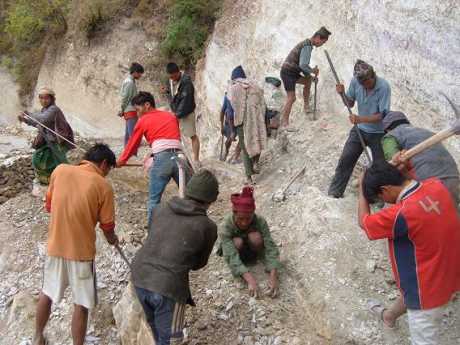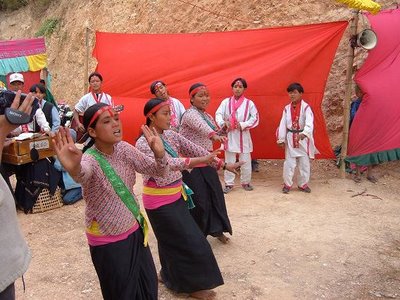
An Interview With An Irish Based Maoist On A Visit To Nepal
An Irish based Maoist and member of World Peoples Resistance Movement recently visited Nepal as part of an International Brigade to construct roads in the Rebel Maoist held areas of Nepal. As well as observing the protests in the cities and villages as he made his way to the Red areas he also worked alongside rebel soldiers, farmers and workers on the Martyrs Road.
During our time in Nepalgunj, we met a young man from Kathmandu who was working for a human rights group. One evening, this man who was unaware of our political affiliations, told us of the day that the PLA had attacked the town only several weeks previously. Greatly shaken by the experience, he was to tell us that together with the uniformed soldiers of the PLA, large numbers of local Maoists with guns also appeared, some firing from rooftops in support of the guerrilla fighters.
In the revolutionary strongholds people's courts have been established where along with other issues, cases against women's exploitation have been brought to book with the combined efforts of Village Defence Committees, women's mass organizations and the people. Many cases of land usurpation of widows or single women have been restored to the injured parties through such courts. Not only those guilty of sexually exploiting women, but also many defaulting husbands who have taken to drinking and beating their wives or practicing polygamy, have been disciplined through such courts.
Forty percent of PLA soldiers are women (the largest representation of female combatants in any army), 80% are party members, and all of them are volunteers. In practice, this "thinking army" is one where everybody knows whom he or she is fighting for, and why. They are fighting for the people, and so, they are fighting for themselves.
There have however, been instances whereby exclusively female guerrilla squads have been organised, most often taking on the task of dealing with feudal tyrants that have been guilty of sexually exploiting women.
PC: Why did you choose to visit Nepal? ,
WPRM Ireland: The Chinese are said to have a curse that masquerades as a blessing: May you live in interesting times. Right now Nepal is going through an interesting and pivotal period of its history. It is a time where, the Communist Party of Nepal (Maoist)'s liberated base areas extend to over 80% of the national territory, including most rural areas, which are home to 85% of the Nepalese people. Landlocked between China and India, the Nepalese interior is largely inaccessible other than by foot, having only an estimated 8,000km of road suitable for motor vehicles in the whole country. Consequently, distances are measured in the number of hours or days it takes to walk, and the majority of Nepalese are cut off from health facilities, schools, and national trade, despite astronomical amounts of foreign aid that had peaked in 2001 to around one-third of the national budget.
In the liberated base areas, the CPN (M) has been engaged in building the new People's Republic of Nepal. An important element in this in recent times has been its project for the construction of 91 kilometres of what is known as the 'Martyrs Road'. Organised by the people-elected Magarat Autonomous People's Republican Government in the main base area, mass organisations have been engaged in building what will, on completion, be a motorable road. With the moral and material support of the masses helping to create the infrastructure of the new people's society, the MAPRG called for international volunteers to come to visit the Martyrs' Road, participate in its building and take the opportunity to learn from the ongoing revolutionary process that was taking place there, on the ground.

Cultural artists perform traditional dances for the workers
PC: So have International volunteers taken part in the road construction?
As the Nepalese people's struggle against the feudal monarchy to establish a democratic republic hit a high point during the month of April, it coincided with the arrival from India of the Second International Road Building Brigade of which I was a member. Drawing its members from several countries, including Afghanistan and Iran, the brigade was gathered with the aim of journeying to Rolpa to work on this road.
The above part is only an extract for
The full interview click here
No comments:
Post a Comment
NOTE : The Comments section is provided in the interests of free speech only. It is mostly unmoderated, but comments that are off topic, offensive, slanderous, or otherwise annoying stand a chance of being deleted. The fact that any comment remains on the site IN NO WAY constitutes an endorsement by Naxal revolution, of any view expressed, fact alleged, or link provided in that comment.